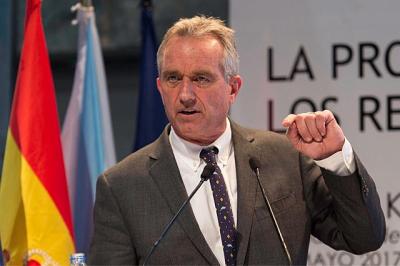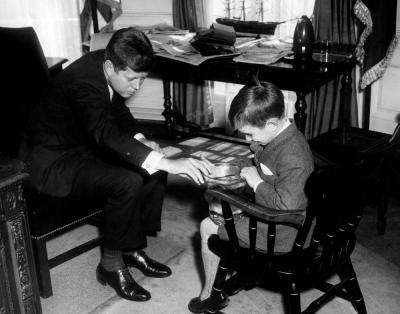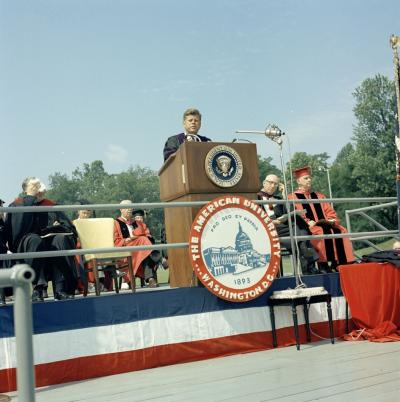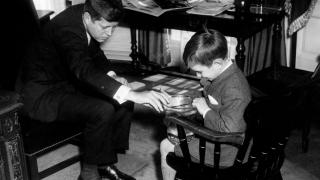June 3—The entry of Robert F. Kennedy, Jr. (RFK, Jr.) into the 2024 U.S. Presidential election has presented Americans with a potential that reaches far beyond that of the ordinary candidacy for president. Kennedy, the nephew of President John Kennedy, (JFK) and the son of former Attorney General and U.S. Senator Robert Kennedy, raised an explosive issue shortly after his April 19 announcement that he will be a candidate for the Democratic nomination for President.
In an interview with WABC radio in New York City on May 8, Kennedy said, of the assassination of his uncle on November 22, 1963, "I think there is overwhelming evidence that the CIA was involved in his murder....I think it's beyond a reasonable doubt at this point....The evidence is overwhelming that the CIA was involved in the murder and in the cover-up." Kennedy had made this charge publicly previously in a tweet on December 17, 2022, calling the assassination of JFK "a successful coup d'etat."

Robert Kennedy Jr. called the assassination of JFK, his uncle, a "successful coup d'etat". Photo: CC wikimedia
What makes this particularly explosive is that his statements coincide with extensive revelations of FBI and CIA illegal actions in Russiagate, and charges of the intelligence agencies' promotion of disinformation, i.e., lies, to cover-up the escalation of the war waged by U.S./NATO forces against Russia in Ukraine. Among the more significant stories being covered up is Seymour Hersh's charge that President Biden and the U.S. were responsible for the sabotage of the Nord Sea pipelines.
RFK, Jr. has been critical of the U.S. role in the Ukraine war, accusing the U.S. of provoking President Putin's decision to launch Russia's Special Military Operation, and refusal to engage in diplomacy to end the fighting. He has also attacked U.S. involvement in "endless wars", and the loss of lives due to the harsh sanction regimes, which add to the loss of lives resulting from those wars.
But what makes his entry so significant goes beyond these legitimate issues he is raising. It opens the door for Americans to look back to the JFK assassination and coverup as the beginning of a fundamental change in U.S. history, and presents an opportunity to revive the best traditions of U.S. foreign policy, expressed in Kennedy's vision of peace in his June 10, 1963 address at American University.

John F. Kennedy and his then young nephew Robert F. Kennedy Jr. Photo: www.jfklibrary.org
JFK and the Cuban Missile Crisis
The late U.S. statesman Lyndon LaRouche called the assassination of JFK "a defining moment for the United States, which launched the long spiral downward...." He added that it was "destabilizing, particularly with the cover-up....The combination of the assassination with the cover-up did destabilize the U.S., the institution of the government of the U.S., [and] destroyed the presidency as an efficient institution of government."
It occurred at a moment during the Cold War when President Kennedy was engaged in intense combat with his advisers and the "Military-Industrial Complex" over the strategic direction of the nation. The near-miss of nuclear war with the Soviet Union during the Cuban Missile crisis provoked in JFK a sober re-evaluation of the strategic/military policy of the U.S., which nearly led to nuclear confrontation. Kennedy's advisers were pushing for a war with the USSR, with their insistence that the U.S. should bomb Cuba, to take out the Soviet missiles there.
They considered Kennedy "weak", because he had refused their demand to engage in a full military attack on Cuba following the debacle of the Bay of Pigs, a failed "covert" action run by the CIA, with full support of the Joint Chiefs of Staff, in April 1961. JFK responded to the Bay of Pigs fiasco by firing CIA chief Allen Dulles and stated that he intended to "splinter the CIA in a thousand pieces and scatter it to the winds."
The anger from the War Hawks grew when Kennedy avoided a nuclear confrontation during the Cuban missile crisis through back-channel discussions between Robert Kennedy and the Soviet Ambassador to the U.S., Anatoly Dobrinin. In return for an agreement from Soviet leader Nikita Krushchev to remove the missiles from Cuba, Kennedy agreed to remove U.S. Jupiter missiles from Turkey, a quid-pro-quo which remained a secret for many years.

JFK'S “Peace Speech”
The shift in JFK's thinking was made public in an extraordinary address on June 10, 1963 to a graduating class at American University in Washington, D.C. This speech came less than eight months after the Cuban missile crisis, during which time there had been ongoing back-channel communications between Kennedy and Krushchev, as both leaders realized they had a common struggle against the Cold War mentality which gripped many of their countrymen in their military-defense-intelligence sectors.

JFK spoke of world peace and nuclear disarmament during commencement exercises at American University. Photo: JFKlibrary.org
In this speech, Kennedy spoke not only to the graduates assembled, but to a broader audience, both in the U.S. and in Russia. He asked,
"What kind of peace do I mean? What kind of peace do we seek? Not a Pax Americana enforced on the world by American weapons of war. Not the peace of the grave, or the security of the slave. I am talking about genuine peace, the kind of peace that makes life on Earth worth living, the kind that enables men and nations to grow and to hope and to build a better life for their children—not merely peace for Americans, but peace for all men and women—not merely peace in our time, but peace for all time."
He continued this appeal to recognize common aims, for all people, saying
"if we cannot end now our differences, at least we can help make the world safe for diversity. For, in the final analysis, our most basic common link is that we all inhabit this small planet. We all breathe the same air. We all cherish our children's future. And we are all mortal."
Krushchev called this speech "the greatest speech by any American president since Roosevelt." Shortly after this speech, on August 5, the Nuclear Test Ban Treaty was signed, after eight years of negotiations, and against the wishes of the hard-line Cold Warriors surrounding Kennedy.
He doubled down on his call for achieving common aims in an address to the United Nations on September 20, 1963, speaking of the hope that all nations could join in peaceful development of the planet:
"Never before has man had such capacity to control his own environment, to end thirst and hunger, to conquer poverty and disease, to battle illiteracy and massive human misery. We have the power to make this the best generation of mankind in the history of the world—or to make it the last. (1)
Urgent Appeal to the Next President
The Schiller Institute has called for a Day of Action on June 10, the sixtieth anniversary of JFK's speech, and a conference on that day, to recreate a living memory of the transformation underway in Kennedy's thinking, to revive the better tradition of U.S. history (2). As stated in the "Urgent Appeal to the (Next) President of the United States", we can only overcome the war danger explicit in the U.S.-U.K.-NATO escalation against Russia and China, by adopting a mentality "that overcomes geopolitics and takes the perspective of the interest of one humanity", as expressed "in that beautiful speech of JFK."
Signers of this appeal "want the United States to be again a beacon of hope and a temple of liberty. We believe that this is the basis for 'peace for all time', as JFK said." In initiating this appeal and the convening of the Conference, Schiller Institute chairwoman Helga Zepp-LaRouche said that it is necessary to show that JFK "represented a completely different paradigm of American politics," one which was replaced by the increasing Hobbesian "war of each against all" which dominates politics in all nations of the TransAtlantic region (3).
Despite the opening created by the announcement by RFK, Jr. of his campaign, it is necessary that an independent movement for a New Paradigm be forged, above partisan politics, to create a new strategic and development architecture for all nations. Only through the activation of the "better angels" of a growing section of citizens can JFK's vision of peace be realized.
Register now for the upcoming Schiller Institute conference.
Footnotes:
1) For a compelling history of the Kennedy presidency, and a thorough analysis of who killed him and why, see "JFK and the Unspeakable: Why He Died and Why It Matters," by James Douglass (2008).
2) To register for the Conference, "The World Needs JFK's Vision of Peace”, use this link.
3) Click here to get the Urgent Appeal.







